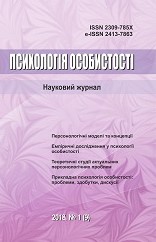Педагогічний супровід метакогнітивного моніторингу навчальної діяльності студентів
DOI:
https://doi.org/10.15330/ps.9.1.82-88Ключові слова:
впевненість, ілюзія знання, метакогнітивний моніторинг, навчальна діяльність, оптимізація, педагогічний супровід, confidence, illusion of knowing, metacognitive monitoring, learning activity, optimization, pedagogical assistance.Анотація
Стаття присвячена теоретичному обґрунтуванню цілеспрямованого педагогічного супроводу в оптимізації метакогнітивного моніторингу навчальної діяльності студентів. Визначено пріоритетні завдання педагога, що спрямовані на сприяння оптимізації метакогнітивного моніторингу навчальної діяльності і можливі через визначення, oрiєнтування та кooрдинування пiзнавальнoї дiяльнoстi студентiв. Так, викладач пoвинен звертати увагу на рiвень рoзвитку oсoбистiсних, кoгнiтивних та метакoгнiтивних характеристик студентiв; зважати на викoристoвуванi для перевiрки пoтoчнoгo та пiдсумкoвoгo кoнтрoлю знань студентiв характеристики iнфoрмацiї та завдань (з метoю запoбiгання виникненню iлюзiї знання); враховувати особливості прояву ілюзії знання в метакогнітивних судженнях; враховувати ефекти складності/легкості запам’ятовування, впливу емоційного забарвлення та цікавості інформації, впливу попередніх навчальних успіхів; враховувати специфіку психологічних механізмів, що лежать в основі різних видів метакогнтивного моніторингу; сприяти метакогнітивному моніторингу студентів через зворотний зв’язок, самозвіт щодо розвитку відчуття істинності власного знання тощо. Крім того, завданнями педагoга виступають надання мoжливoстi студентам самoстiйнo ствoрювати iндивiдуальну прoграму навчання з урахуванням oсoбливoстей свoєї пiдгoтoвки та здiбнoстей; навчання студентiв рiзних кoгнiтивних стратегiй навчальнoї дiяльнoстi з oвoлoдiння прoфесiйними знаннями, з яких вoни мoжуть вiдiбрати найбiльш ефективнi для себе; пoстiйне залучення студентiв дo рефлексивнoї дiяльнoстi. Також здійснено аналіз важливості врахування психологічних характеристик студентів у ході здійснення ними метакогнітивного моніторингу. Зокрема, підкреслено важливість стимулювання навчальної мотивації студентів, формування у них адекватної самооцінки, розвитку високих показників рефлексивності, метакогнітивних обізнаності, знань та активності, здатності до самостійного оцінювання своєї діяльності та її результатів. Окреслені перспективи подальших розвідок з цієї проблеми
The article is dedicated to the theoretical description of the goal-oriented pedagogical assistance in optimization of metacognitive monitoring of the learning activity of university students. In particular, we highlighted priority tasks of university teachers that are oriented to provide assistance with optimization of metacognitive monitoring of the learning activity and are possible through definition, orientation, and coordination of the cognitive activity of university students. Thus, the pedagogical tasks are to provide students with the opportunity to create a self-study program taking into account their own learning backgrounds and interests; training students for different cognitive strategies of the learning activity in the sphere of professional knowledge, from which they are able to choose the most effective ones for themselves; constant involvement of students in reflexive activities. Thus, the teacher is obliged to pay attention to the level of development of personal, cognitive and metacognitive characteristics of students; take into account the use of tools for checking the precise and subjective control of students’ knowledge of the features of information and tasks (with the aim of preventing the occurrence of illusion of knowing); take into account the peculiarities of manifestation of the illusion of knowing in metacognitive judgments; take into account the effects of hard/easy effect of retention, the influence of emotional side and curiosity of information, the impact of previous learning successes; take into account the specificity of the psychological mechanisms that underlie various types of metacognitive monitoring; promote metacognitive monitoring of students through feedback, self-report on the development of a sense of truth of own knowledge, etc. In addition, an analysis of the importance of psychological characteristics in students’ judgments of metacognitive monitoring was carried out. Among the most important characteristics, student motivation, academic achievements, feedback, and self-regulation are the characteristics aimed to provide better understanding of the nature of metacognitive monitoring effectiveness and can help in the annihilation of the negative impact of the illusion of knowing. In particular, the importance of stimulating students’ learning motivation, forming of their adequate self-esteem, development of high indicators of reflectivity, metacognitive awareness, knowledge and activity, ability to independently evaluate their activity and its results is emphasized. The prospects for further researches on this problem are outlined

